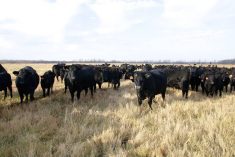VERNON, B.C. – Like storm clouds threatening, the upcoming native land claim settlements hover on the British Columbia skyline.
With 35 treaty negotiations and overlapping land claims to be dealt with, agriculture and forestry groups wonder how the negotiations will affect their livelihood.
Wendy Grant, vice-chief for B.C. for the Assembly of First Nations, told a panel discussion hosted by the British Columbia Cattlemen’s Association that she understands their worries.
Most of the province’s grazing land is on crown land. And ranchers are wondering if they’ll even be able to keep their grazing permits since a large share of the land is on the negotiating table. Nor do they know if their next landlord will be an Indian band or the province, or if they’ll be allowed to continue grazing the land.
Read Also

U.S. farm group supports supply management
U.S. grassroots farm advocacy group pushing new agriculture legislation that would move towards supply management like Canada has for dairy industry
“I recognize the fear that happens when you aren’t given the complete picture,” Grant said during the cattlemen’s annual convention.
Land claims are an important issue not only for ranchers, said Bill Wimpney, director of native affairs for the B.C. Wildlife Federation. “Of all the issues that have come forward throughout our history, land claims is probably going to be the most significant single item that any of us ever have to deal with.”
For the natives, these disputes involve historical grievances and the issue of respect. Chief Bob Pasco of Ashcroft, who is also a rancher, said he doesn’t want “cookie-cutter solutions” applied to all B.C. bands during the negotiations. He wants individual treaties.
He said the Indian Act prohibits them from using natural resources. Pasco prefers to negotiate for land and resources in a rational matter, but isn’t afraid of taking drastic action.
“I’ve stopped a few trains and done some pretty wild things in my time and I’m prepared to do it again. I don’t have that much to lose,” he said.
Kamloops lawyer Mary MacGregor sits on the Treaty Negotiation Advisory Committee that represents third parties interested in the outcome of negotiations. She said the committee’s position is that all treaty and land settlements should be paid cash and that all settlements be final.
Unlike aboriginals in other provinces, natives in B.C. didn’t sign treaties.
Previous court cases have ruled natives do have land rights and recommended that any claims be handled through negotiations rather than a costly legal struggle.
“Millions of dollars have been spent in court battles, yet many of the issues remain to be resolved,” said Grant.
About 110 percent of the land in the province is up for negotiations because of overlapping claims. Grant said boundaries should be negotiated among the bands because some of the land is part of common territory shared generations ago.
“This is different from the English common law perspective of land which identifies clearly defined boundaries,” she said.
Less than one percent of B.C.’s land is now reserve land. There are 1,613 reserves in B.C., about half the reserves in Canada.















